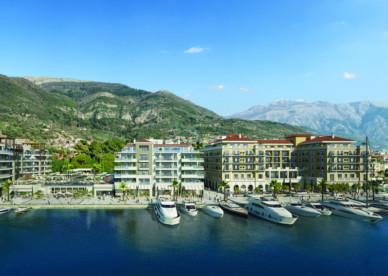
Being one of the youngest independent and also smallest nations in the world, Montenegro is not on everyone’s radar and some may have even problems locating it on the map. But given the improvements in infrastructure, economy and social stability since its segregation from Serbia and its declaration of independence in 2006, Montenegro has been gradually gaining interest from investors world wide.
With its undeniable Adriatic charm, beautiful cultural heritage, mild climate, postcard beaches, majestic mountains and tranquil waters with a large biodiversity, the country has enormous growth potential particularly in tourism and related infrastructure. The World Tourism and Travel Council even ranks Montenegro third in a list of fastest-growing tourism destinations between 2015 and 2025.
“Montenegro is an upper middle-income country with enormous growth potential, aspiring to join the EU by 2020,” says Dragana Varezic, spokesperson of the World Bank office in the capital Podgorica, adding that the country’s GDP growth forecast is close to 3 per cent annually up to 2019.
This has not gone unnoticed in the UAE. Last year, the Investment Corporation of Dubai, the emirate’s sovereign investment arm, started developing Porto Montenegro, a harbour in the Unesco-listed Bay of Kotor, into a leisure destination with a posh yacht marina, a residential village with vacations homes, a luxury hotel, and a promenade with retail space and restaurants. It is seen by observers as one of the currently most ambitious leisure projects in Europe, with an estimated investment volume of $200 million [Dh734.59 million] and the aim to make it a “Monaco of the Balkans.”
Other current UAE-related projects in Montenegro are The Capital Plaza in central Podgorica, so far the largest mixed-use real estate development in the country backed by the Abu Dhabi Financial Group (ADFG). It includes residences, retail, restaurants and hotels. ADFG also wants to develop hotel resorts and housing projects along the coast and acquire food and beverage franchises in Montenegro.
Apart from UAE-backed projects, other Arab investors have also discovered Montenegro’s charms: Qatari Diar is working on a resort called Plavi Horizonti with 140 new homes, and US developer North Star, backed by European and Middle Eastern capital, is creating a resort called Montrose Montenegro on a 53-hectare property. Both projects are on the Lustica Peninsula. Egypt’s Orascom has started to develop a resort in Lustica Bay for around $1.2 billion.
In a nutshell, here are the reasons why property and hospitality investments in Montenegro are indeed worth a look.
Exclusive character
Montenegro is an undiscovered gem in the Mediterranean, unique in many ways. Its landscape is a mix of much natural wealth, with sandy beaches (further north in Croatia, most beaches are rocky), clear lakes and rivers and rugged mountains all in a compact area, which makes for a combination of sea and mountain holidays.
It is far from busy and overcrowded like comparable holiday destinations in Italy, Spain and France, and it is more exclusive than Greece, while having a similar atmosphere and climate, but far less “touristy”.
Tourism impact
In economic terms, the total contribution of the tourism industry to the Montenegrin GDP, including investments and supply chain, amounted to €846.4 million (Dh3.67 trillion) last year, or around 22 per cent of GDP, and is expected to grow by 6.3 per cent to €900 million this year, according to the World Travel and Tourism Council. The sector currently employs 12,500 workers, and annual job growth is expected to be at 3.5 per cent through 2027.
Ease of investment
Montenegro has high potential for foreign direct investment owing to its business-focused economic system, which promotes economic freedom and monetary stability.
“Montenegro’s credit strengths include its relatively high per-capita GDP wealth levels compared with its peers, progress in the country’s EU accession strategy and a growth outlook supported by large inflows of foreign direct investment, with projects in tourism and renewable energy,” says Rita Babihuga-Nsanze, a senior country analyst at rating agency Moody’s.
Ease of doing business
In Montenegro, foreign companies have the same rights as national companies, the corporate tax system is one of the most competitive in Europe at a rate of 9 per cent, the workforce is qualified and wages are relatively low, the euro is the national currency, formalities for creating a company are simple and quick, and the country is a stable democracy. Currently, Montenegro ranks 51 out of 190 economies in this year’s ease of doing business report by the World Bank.
Moderate prices, costs
Montenegro’s vacation property prices such as the ones in Porto Montenegro are lower than elsewhere in the Mediterranean, despite being equipped with prime amenities that indicate high capital appreciation. In turn, the cost of living in Montenegro is also much lower compared with most of Europe. Montenegro is a middle-income country, with salaries and wages comparably moderate to Western Europe. In terms of taxation, there are incentives such as a value-added tax waiver for condo-hotel investments.
Improving infrastructure
Due to its geographical features, Montenegro currently has road infrastructure not at Western European standards. Construction of new motorways and railways is considered a national priority to promote the country as an attractive tourist destination. The area around Lustica Bay is also ideal for boat and yacht owners since the waters off Montenegro are among the best cruising grounds in the Mediterranean. Berths in Porto Montenegro, for example, can be leased for up to 30 years in combination with the purchase of a holiday home. There are two airports in the country, in Podgorica and Tivat, whose connectivity is constantly improving.
For GCC residents, Podgorica Airport can be reached most conveniently through a stopover in Istanbul, while Tivat Airport, which is close to the Bay of Kotor and the Lustica Peninsula developments, has a seasonal direct connection with Dubai operated by flydubai. Air Serbia, however, will discontinue its flight connection between Belgrade and Abu Dhabi, which was also a convenient way to reach Montenegro by air from the UAE, in October 2017. Furthermore, the Montenegrin government in 2015 removed all visa requirements for UAE citizens.
Red flags
However, in some areas investors should be vigilant. There are still high levels of politisation of justice, combined with unreliable land registry processes, a sluggish bureaucracy, and problems with corruption and organised crime, which is why local partnerships and domestic legal support are advisable. Macroeconomically, the country has a high foreign trade deficit and considerable foreign debt, as well as an underdeveloped intellectual property law. However, with Montenegro’s aspirations of joining the EU, these issues are likely to be resolved over time.











